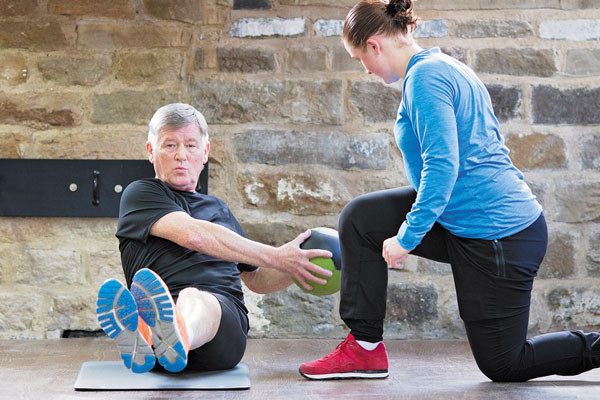
What are somatic workouts?

How to curb your stress eating

How to spot Parkinson’s disease symptoms

8 simple ways to reduce ultra-processed foods in your diet

Heart failure symptoms in women: How they’re different

GERD diet: Foods to avoid to reduce acid reflux

Strong is the new skinny

Everyday habits that sneakily weaken your bones

Don’t wait to get help for back pain

Correcting how you walk may ease osteoarthritis knee pain
Staying Healthy Archive
Articles
Don’t skip your next comprehensive, dilated eye exam
It appears that vision impairment and blindness among U.S. adults ages 40 or older will double in the next 35 years, mostly because of an aging population.
The perks of group fitness classes
Fellow exercisers may keep you motivated, and learning proper form can help you avoid injuries.
Image: Purestock/Thinkstock
Is your solo walking or cycling routine getting a little humdrum? Maybe it's time to try a group fitness class at your local gym or community center. Working out with others in a class led by a trained instructor may help you stick to an exercise routine, which is a vital part of keeping your heart healthy.
"We know that in a broad sense, the more fit you are, the longer you live," says Dr. Meagan Wasfy, a cardiologist at the Cardiovascular Performance Program at Harvard-affiliated Massachusetts General Hospital. Exactly how you achieve that fitness doesn't seem to matter—the main thing is making it happen. Group fitness classes, which come in a wide range of styles and intensities, may offer certain advantages toward that goal.
Should you join a research study?
Like legions of earlier volunteers, you could contribute to the quest to improve care for people with heart disease.
Image: Wavebreakmedia/Thinkstock
Imagine getting a letter from a physician based at a nearby academic medical center, telling you about research under way at the institution. It says you might be eligible to participate in a clinical trial designed to test a new blood pressure drug. Or maybe it's a study on the exercise habits of people ages 65 and older.
You're curious, so you check the box indicating that you're interested in learning more and mail it back.
Weight-loss surgery: Moving into new dimensions?
Bariatric surgery can dramatically improve type 2 diabetes and other risks for heart disease.
The latest statistics on obesity suggest that this disease remains a huge problem in the United States: nearly one in three American adults meet the criteria for obesity. What's more, about one in 10 women and one in 20 men are considered extremely obese (see "Obesity in the extreme").
People with extreme obesity face a high risk of cardiovascular disease and myriad other health problems, as well as a shortened life span. Most have struggled with excess weight since childhood or early adulthood, and many have undergone multiple, frustrating attempts to shed pounds. For some, weight-loss surgery (also known as bariatric surgery) may be the best—perhaps only—option for lasting weight loss.
Fitness in midlife may fend off strokes later
People who are more physically fit in their mid-to-late 40s may be less likely to have a stroke after age 65 than those who are less fit.
Don’t fear the reaper: Eat more whole grains
People who eat at least four servings of whole-grain foods per day appear to have a 23% lower risk of dying of cardiovascular disease compared with people who eat little or no whole grains.
Should I know my percentage of body fat?
Body fat percentage provides valuable information about your overall risk for diseases like heart disease and diabetes, but determining your body mass index and measuring your waist size offer easy the best tools for estimating total body fat.
Is it always important to get a second medical opinion?
Men should always seek out a second medical opinion anytime they are given a diagnosis of serious illness or a recommendation for surgery. Also, when seeking a second opinion, it is best to visit a different medical center to get a truly independent diagnosis, and to bring along a family member or friend to accurately record the new information.
What a personal trainer can do for you
Trainers offer extra motivation to meet your fitness goals.
Image: Barryj13 /Thinkstock
You always want a good return on your investment, especially when you reach retirement age. That goes for your fitness, too. One of the best moves for a lucrative long-term payoff is to invest in a personal trainer.
"The exercises that worked when you were younger probably are not what you need now and going forward," says Vijay A. Daryanani, a certified personal trainer with Harvard-affiliated Spaulding Outpatient Center. "A personal trainer can identify your needs and formulate the proper routine as well as keep you motivated and focused, all of which can help keep you active."
The cost of generic and name-brand drugs
More prescription medications now come in generic versions. But do you ever choose savings over quality?
Image: AlonsoAguilar /Thinkstock
Medication can be an unpredictable and costly expense. Whether it is short-term treatment or multiple drugs you take indefinitely, prescriptions can have a serious impact on your wallet.
Nowadays there are many generic versions of brand-name drugs that are often significantly less expensive. There are generic drugs to treat most common ailments, such as pain, high cholesterol, high blood pressure, diabetes, asthma, and depression.

What are somatic workouts?

How to curb your stress eating

How to spot Parkinson’s disease symptoms

8 simple ways to reduce ultra-processed foods in your diet

Heart failure symptoms in women: How they’re different

GERD diet: Foods to avoid to reduce acid reflux

Strong is the new skinny

Everyday habits that sneakily weaken your bones

Don’t wait to get help for back pain

Correcting how you walk may ease osteoarthritis knee pain
Free Healthbeat Signup
Get the latest in health news delivered to your inbox!
Sign Up











